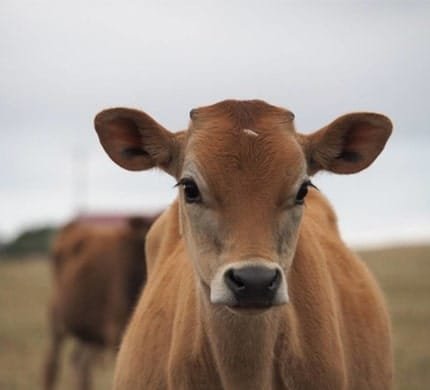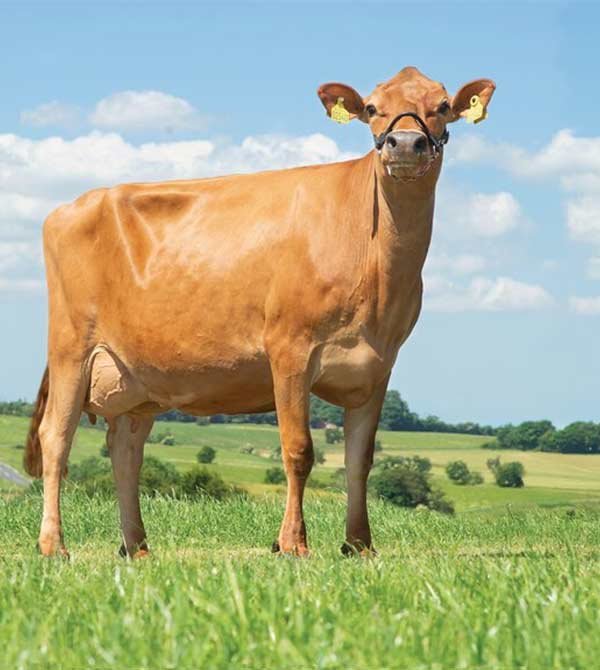Jersey
- Temperature:Both hot and cold
- Milk:Higher percentage of butterfat
- Food:Grazers, hay, silage and forages.
- Pregnancy:Around 280-290 days
- Nationality:US, Canada and Australia.

General Information
Jersey cattle are a breed of small dairy cattle that are primarily known for their high-quality milk. They originated on the island of Jersey in the English Channel, where they were first domesticated in the 18th century. Jersey cattle are typically smaller than other dairy breeds, with a compact, muscular build and a characteristic light brown coat. They are known for their gentle temperament and docile nature, which makes them easy to handle and work with.
In addition to their milk, which has a higher percentage of butterfat and protein than milk from other breeds, Jersey cattle are also valued for their meat, which is tender and flavorful. They are adaptable to a range of climates and are raised in many parts of the world, including the United States, Canada, and Australia. Overall, Jersey cattle are a popular and versatile breed that are well-suited to dairy production in a variety of settings.
Where we find this cow to buy?
Jersey cattle can be purchased from a variety of sources, depending on your location and specific needs. Here are some options:
01. Livestock auctions: Livestock auctions are a common way to purchase Jersey cattle. They often have a variety of animals available for purchase, and prices may be negotiated or set through a bidding process.02. Private breeders: Private breeders may have Jersey cattle available for sale. You can find breeders through online directories or by contacting local farming organizations or breed associations.03. Online marketplaces: There are several online marketplaces that specialize in livestock sales, including Jersey cattle. These sites may offer a wide variety of animals for sale from breeders across the country or even internationally.

How to increase milk production in Jersey?
There are several ways to increase milk production in Jersey cattle. Here are some tips:
01
Proper nutrition is essential for milk production in Jersey cattle. Cows should be fed a balanced diet that meets their energy and nutrient needs, which can vary depending on their stage of lactation, body condition, and other factors.
02
Water is essential for milk production, so it’s important to ensure that Jersey cattle have access to clean, fresh water at all times.
03
The frequency of milking can have a significant impact on milk production in Jersey cattle. Cows should be milked at least twice a day, and in some cases, three times a day may be necessary.
04
Proper milking techniques are important for maximizing milk production and maintaining udder health. Milking should be done in a clean, dry environment using appropriate equipment and techniques.
Medicine
There are several types of medicine that may be used for Jersey cattle, depending on their specific health needs. Here are some examples:
01
AntibioticsAntibiotics may be used to treat bacterial infections in Jersey cattle, such as mastitis or pneumonia. These medications are typically administered orally or by injection and are available by prescription from a veterinarian.
02
DewormersDewormers are medications that are used to control internal parasites in Jersey cattle. These medications may be administered orally or by injection, and there are several different types available depending on the type of parasite being targeted.
03
Anti-inflammatory DrugsAnti-inflammatory drugs, such as non-steroidal anti-inflammatory drugs (NSAIDs), may be used to reduce inflammation and pain in Jersey cattle.
04
HormonesHormones may be used to regulate reproductive function in Jersey cattle, such as inducing estrus or synchronizing ovulation for breeding purposes.
Pregnancy
Like all cows, Jersey cattle have a gestation period of approximately nine months, or 280-290 days. During pregnancy, Jersey cows require proper nutrition and care to ensure the health of both the cow and the developing calf.
Here are some things to keep in mind during a Jersey cow’s pregnancy:
Proper nutrition is essential during pregnancy to support the growth and development of the calf. Cows should be fed a balanced diet that meets their energy and nutrient needs, which may require adjustments throughout the pregnancy.
It’s important to monitor the health of the cow throughout the pregnancy to ensure that she is maintaining proper body condition and is not experiencing any health issues.
In the weeks leading up to calving, it’s important to prepare for the delivery of the calf by ensuring that the cow has a clean and comfortable place to give birth, and that all necessary supplies and equipment are on hand.
After calving, the cow will require special care and attention to ensure that she is recovering properly and producing adequate milk for the calf. This includes monitoring for signs of infection or other health issues, and providing appropriate nutrition and care for the calf as well.
Important!
It’s important to note that the use of medications in Jersey cattle should be done under the guidance of a veterinarian and in compliance with all relevant laws and regulations. Additionally, it’s important to follow all medication dosages and withdrawal periods to ensure that the animal’s health is not compromised and that any potential residues in the animal’s meat or milk are within acceptable limits.
Food
Proper nutrition is important for Jersey cattle to maintain good health and productivity. Here are some types of food that are commonly fed to Jersey cows:
Forage, such as hay, silage, or pasture grasses, should make up the bulk of a Jersey cow’s diet. Forage provides fiber and essential nutrients such as protein, minerals, and vitamins.
Concentrates, such as grains and protein supplements, may be fed to Jersey cows to supplement their forage intake and provide additional energy and protein.
Jersey cows require a balanced intake of minerals and vitamins to maintain good health and productivity. These may be provided through a mineral and vitamin supplement or through a fortified concentrate feed.
Access to clean, fresh water is essential for Jersey cows to maintain good health and milk production. Cows should have access to water at all times, and water sources should be clean and free from contaminants.
Facts
Here are some interesting facts about Jersey cattle:
They are a small breed of dairy cattle that originated on the island of Jersey, which is located in the English Channel.
They are known for their unique coloring, which is a shade of brown ranging from light fawn to dark mahogany.
They are highly valued for their milk, which is known for its high butterfat content and rich, creamy flavor.
They are known for their docile and friendly temperament, which makes them popular with dairy farmers and hobbyists alike.
They are adaptable to a wide range of climates and environments and are raised on dairy farms around the world.
The American Jersey Cattle Association (AJCA) was founded in 1868 and is the oldest breed association in the United States.
In addition to their milk, Jersey cattle are also valued for their manure, which is rich in nutrients and can be used as a natural fertilizer for crops.
Jersey cows have been bred for thousands of years, and were originally used for both milk and meat production.